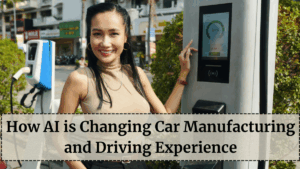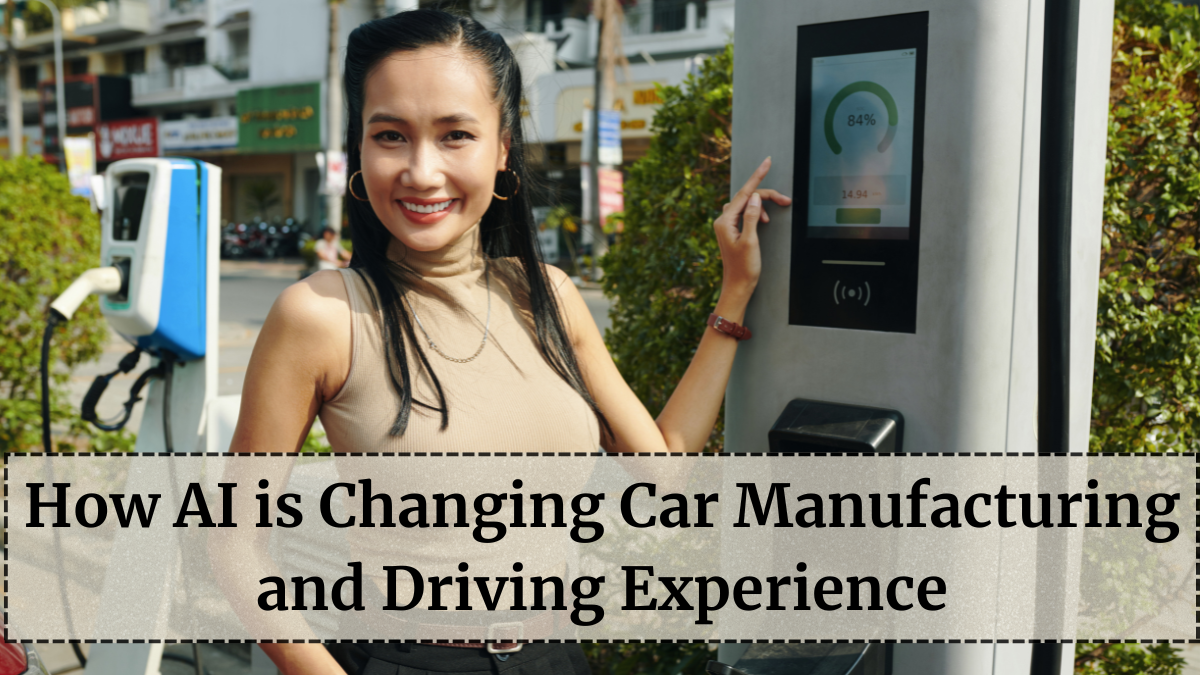Artificial Intelligence (AI) is no longer a futuristic concept for the automobile world — it’s the driving force behind the industry’s evolution. From smart factories that use robots and predictive algorithms to vehicles that make real-time decisions on the road, AI in automobiles is creating a new era of efficiency, safety, and personalization.
In 2025, the integration of AI in cars and manufacturing is reshaping how vehicles are designed, produced, maintained, and even driven. Let’s explore how AI is redefining every stage of the automotive ecosystem.

AI in Car Manufacturing – Smarter, Faster, and More Efficient
Predictive Production and Robotics
Car manufacturing is now powered by AI-driven robotics that can assemble vehicles with precision and speed. These intelligent robots learn from human behavior, reducing assembly errors and downtime. Predictive maintenance powered by AI can detect potential machine faults before they happen, saving both time and cost.
Quality Control and Defect Detection
AI systems equipped with computer vision can instantly scan vehicles for defects that humans might miss. This results in higher build quality, improved consistency, and reduced wastage. For example, companies like BMW and Toyota use AI image-recognition systems to detect micro-cracks or paint inconsistencies in real time.
Supply Chain Optimization
AI also plays a major role in supply chain management. Through demand forecasting and real-time inventory tracking, automakers can ensure the right components are available at the right time. This minimizes production delays and maximizes factory output.
AI in Car Design and Engineering
Generative Design and Prototyping
AI tools like Generative Design Systems can simulate thousands of design variations based on weight, cost, and performance goals. This helps engineers create lighter, safer, and more efficient cars. For instance, General Motors and Autodesk use AI-driven design to reduce material use without compromising strength.
Virtual Testing and Simulation
Instead of relying solely on physical crash tests, AI-based simulations now predict outcomes with high accuracy. This saves millions in research and development and accelerates the testing process for new vehicle models.
AI in Driving Experience and Vehicle Performance
Advanced Driver Assistance Systems (ADAS)
AI has made semi-autonomous driving a reality. Features like lane keeping, adaptive cruise control, collision avoidance, and automatic emergency braking are powered by real-time AI analytics. These systems analyze data from radar, cameras, and sensors to make split-second driving decisions that enhance safety.
Voice Assistants and Personalization
Modern cars come equipped with AI-powered assistants such as Alexa Auto or Google Assistant, which understand natural speech and driver preferences. From adjusting the temperature to playing favorite playlists, AI personalizes every journey to match the user’s mood and habits.
Predictive Maintenance and Performance Analytics
AI continuously monitors vehicle health using connected sensors. It predicts when components like brakes or batteries need servicing, preventing costly repairs and breakdowns. This technology is now becoming standard in luxury and mid-range EVs.
AI in Autonomous Vehicles – The Future of Mobility
AI forms the foundation of self-driving cars, which rely on machine learning, sensor fusion, and computer vision to navigate safely. Companies like Tesla, Waymo, and NVIDIA are training algorithms with billions of real-world and simulated miles to handle complex driving environments.
While full autonomy is still under development, Level 3 and Level 4 self-driving features are expected to become mainstream by 2026, marking the next big leap in transport automation.
Challenges in Adopting AI in Automobiles
Despite its benefits, integrating AI into the automotive world faces several challenges. Data privacy, high implementation costs, and cybersecurity remain major concerns. As vehicles become more connected, ensuring data safety and ethical AI use will be key priorities for manufacturers.
The Road Ahead
The AI revolution in the automobile industry is not slowing down. From manufacturing plants to steering wheels, AI is making cars smarter, safer, and more adaptive. With every passing year, vehicles are learning more about drivers — predicting needs, avoiding risks, and optimizing journeys.
By 2030, the term “smart car” will no longer be futuristic — it will be the industry standard.
FAQs
What is the role of AI in car manufacturing?
AI automates assembly, predicts machine failures, and ensures precision through robotics and real-time defect detection.
How does AI improve driving safety?
AI powers features like automatic braking, collision alerts, and lane assistance, helping prevent accidents and improving driver response times.
Can AI completely replace human drivers?
Not yet. While Level 4 autonomy is close, full self-driving (Level 5) requires more training data, infrastructure, and regulatory support.
Which companies are leading in automotive AI development?
Tesla, Waymo, BMW, Toyota, and NVIDIA are leading innovators using AI for self-driving, manufacturing, and predictive analytics.
What are the main benefits of AI in cars?
AI enhances safety, reduces maintenance costs, personalizes driving experiences, and optimizes fuel or battery efficiency.
Click here to know more.
